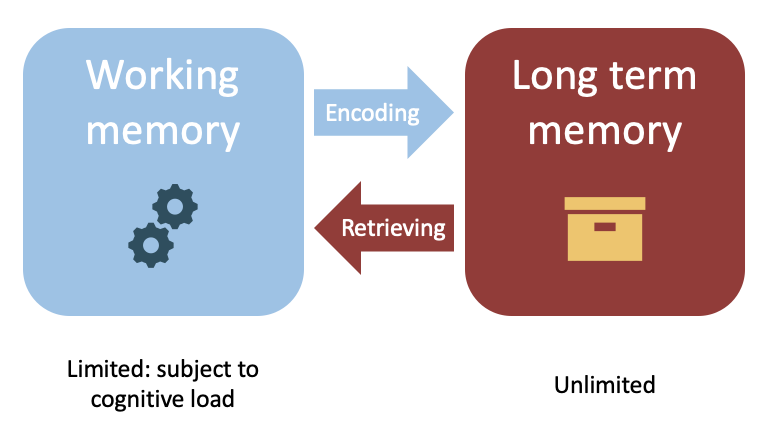This section explains how retrieving information from long term memory, as shown in Figure 1, strengthens learning.

Retrieval of information strengthens learning. Once information is encoded and stored in long term memory, students need to retrieve that information when needed. Evidence shows that it is the act of retrieving information that allows students to learn deeply and remember, more so than the initial coding of information (Brown, 2014; Kleiman, 2017). Multiple studies have demonstrated that testing on newly learned information improves outcomes compared to rereading or studying material. Referred to as the testing effect, this finding has held up across decades of research (Larsen, 2009; Dunlosky, 2013; Agarwal, 2019; Carpenter, 2022). Additionally, research suggests that testing on material also improves the learning of subsequently presented material (Yang, 2018). Retrieval practice is a way for students to strengthen their learning.
What does retrieval practice look like in the classroom and beyond?
- Asking in-class questions on previously presented material (graded or ungraded).
- Free recall written responses
- Open-ended or short answer written responses
- Multiple choice questions by voting or audience response systems like Chime-in
- Turn to your neighbor discussions followed by large group discussion
- Providing quizzes, practice tests, or virtual flashcard programs like H5P in Pressbooks that can be embedded in Canvas so that students don’t have to share any personal information.
- Assigning homework as a before class orienting task that has students practice applying content, as well as homework that asks students to revisit and practice outside of class what they have learned.
To make retrieval practice effective, make sure to ask students to recall information before providing them with an answer or feedback. This ensures students are actively retrieving information rather than simply recognizing a correct answer.
Strategies for asking students to retrieve previously covered material
- Use frequent quizzing or exams. (Ambrose, 2010; Agarwal, 2019; Sotola, 2021). Replace the traditional “2- midterms-and-a-final” format with multiple low-stakes assessments. Frequent assessments require students to engage with and retrieve material more often than cramming which can result in deeper learning. The use of frequent testing discourages a “cram and forget” approach to studying. It also reduces the grade impact of one bad performance. Research shows an association between the use of frequent quizzes and improved academic performance (Sotola, 2021).
- Connect new content with previous content. (Halpern, 2003; Ambrose, 2013; Lang, 2016; Agarwal, 2019). This provides more cues for students to retrieve the information later. This can be done by providing in-class questions with feedback (Angelo & Cross, 1993; Ambrose, 2010; Tanner, 2013). Giving students feedback on their performance allows them to gauge which areas they know well, and which areas need further attention.
Example questions may include:- Of the 3 principles we’ve discussed, where would you align this practice?
- Which artist’s influence can you see in this painter’s work?
- In what ways does this approach differ from the approach we discussed last week?
- Ask students to make predictions about new learning based on prior learning. (Kleiman, 2017; Agarwal, 2019). This practice asks students to retrieve and apply information from long term memory.
Example questions are:- If there is a mutation that affects the structure of hemoglobin in the blood so that it binds oxygen less efficiently, what happens to the body’s ability to take up oxygen? What signs and symptoms would you expect?
- Based on the demographics for this group, what would you predict their voter turnout to be?
- Considering Boyles law, do you expect the volume of the balloon to increase, decrease or stay the same?
- Make exams and quizzes cumulative. (Larsen, 2009; Ambrose, 2010, Dunlosky, 2013, Khanna, 2013; Agarwal, 2019). Knowing in advance that assessments are cumulative encourages students to retrieve information from previous assessments as part of their study approach, thus strengthening learning and improving retention.